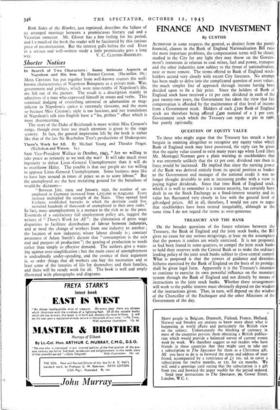FINANCE AND INVESTMENT
By CUSTOS
ALTHOUGH in some respects the general, as distinct from the purely financial, clauses in the Bank of England Nationalisation Bill raise the more important problems, the compensation terms will be closely, studied in the City for any light they may throw on the Govern- ment's intentions in relation to coal mines, fuel and power, transport and the other industries now subject to the threat of nationalisation, near or more remote. The terms offered to Bank of England stock- holders accord very closely with recent City forecasts. No attempt has been made to delve into the complicated question of asset values, the much simpler line of approach through income having been decided upon to fix a fair price. Since the holders of Bank of England stock have received a 12 per cent. dividend in each of the past twenty-two years, the Government has taken the view that fair compensation is afforded by the maintenance of that level of income from a Government stock. Holders of each Lioo Bank of England stock are therefore being offered L40o nominal of a 3 per cent. Government stock which the Treasury can repay at par in 1966, but purely optionally.
QUESTION OF EQUITY VALUE
To those who nlight argue that the Treasury has struck a hard bargain in omitting altogether to recognise any equity value which Bank of England stock may havd possessed, the reply can be given that the equity value ceased to exist many years ago when Lord (then Mr. Montagu) Norman gave a plain warning to stockholders that it was extremely unlikely that the 12 per cent. dividend rate then in force would be increased. He implied that since the earning power of the Bank was derived entirely from its special position as banker to the Government and manager of the national credit it was no longer thought desirable to aim at increasing profits with a view to paying higher ,dividends. Since that time Bank of England stock, which it is. well to remember is a trustee security, has certainly been dealt in on the Stock Exchange as a fixed-interest security and its value has fluctuated very closely in line with the general level of gilt-edged prices. All in all, therefore, I would not care to argue that stockholders have been treated inequitably, although at the same time I do not regard the terms as over-generous.
TREASURY AND THE BANK On the broader questions of the future relations between the Treasury, the Bank of England and the joint stock banks, the Bill gives no cause for any serious misgivings, at least on the assumption that the powers it confers are wisely exercised. It is not proposed, as had been feared in some quarters, to compel the joint stock banks to hold their reserves with the Central Bank or to make the ordinary lending policy of the joint stock banks subject to close central control. What is proposed is that the powers of guidance and direction, hitherto exercised by the Bank of England on the basis of its prestige, shall be given legal form. Apparently it is the Treasury's intention to continue to exercise its own powerful influence on the monetary system through the Bank of England and not directly by means of instructions to the joint stock banks. Whether these arrangements will work to the public interest must obviously depend on the wisdom of the instructions given. That, in turn, will depend on the wisdom of the Chancellor of the Exchequer and the other Ministers of the
Government of the day. a


























 Previous page
Previous page